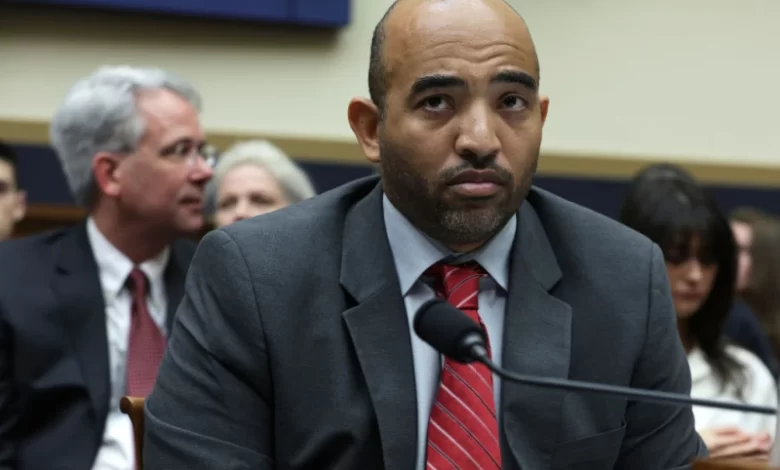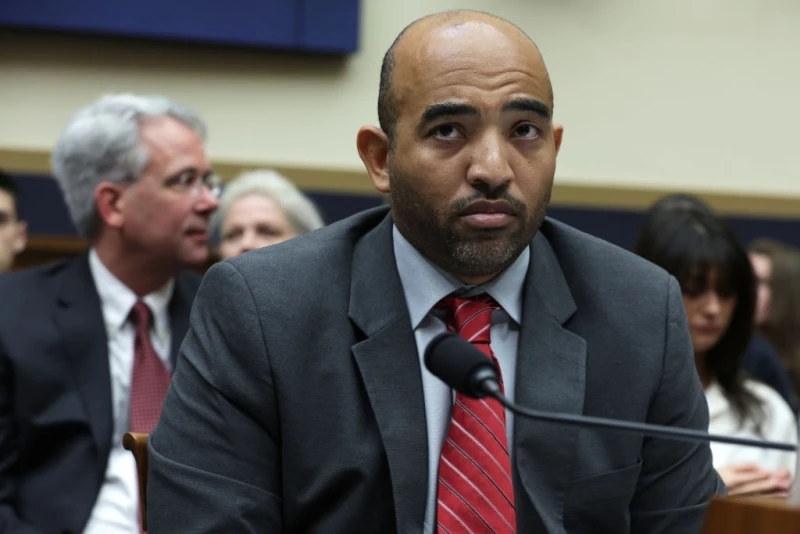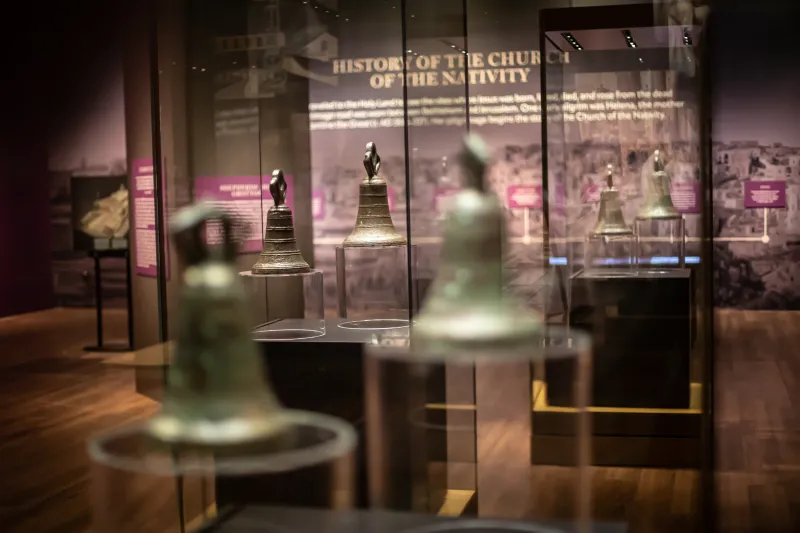Exclusive: Catholic FBI whistleblower Marcus Allen discusses how faith inspired action

 Suspended FBI agent Marcus Allen testifies during a hearing before the Select Subcommittee on the Weaponization of the Federal Government of the House Judiciary Committee at Rayburn House Office Building on May 18, 2023, on Capitol Hill in Washington, D.C. / Credit: Alex Wong/Getty Images
Suspended FBI agent Marcus Allen testifies during a hearing before the Select Subcommittee on the Weaponization of the Federal Government of the House Judiciary Committee at Rayburn House Office Building on May 18, 2023, on Capitol Hill in Washington, D.C. / Credit: Alex Wong/Getty Images Washington, D.C. Newsroom, Oct 15, 2024 / 18:05 pm (CNA).
An FBI whistleblower who spent two years fighting to regain his security clearance after questioning the agency’s leadership told CNA that his Catholic faith and his desire to serve the public motivated his actions.
“I felt convicted in my actions by the Holy Spirit,” Marcus Allen, the FBI whistleblower, told CNA.
Allen, who served in the Marine Corps from 2000 to 2005, has held a Top Secret security clearance since 2001, with the exception of the two years it was suspended. He joined the FBI in 2015 as a staff operations specialist. In 2019, he was the employee of the year at the Charlotte Field Office.
In March 2022, the FBI suspended Allen’s security clearance. According to Allen, this disciplinary action was a result of concerns he had raised with his supervisors about FBI Director Christopher Wray’s testimony concerning the events of Jan. 6, 2021. He said he believed the action was also a result of his refusal to get the COVID-19 vaccine.
According to the FBI, Allen was suspended due to “security concerns” related to “allegiance to the United States” and “personal conduct.”
Allen, in an interview with CNA, said he had expressed concerns to his supervisors that the FBI director had refused to answer questions from lawmakers about federal agents and informants at the Capitol on Jan. 6, 2021. He further asked whether there were confidential informants present that day during the protest and attack on the U.S. Capitol building.
Allen later sued the FBI and reached a settlement in May of this year, which reinstated his security clearance and guaranteed the FBI would provide back pay.
Testifying before the House Judiciary Subcommittee on the Weaponization of the Federal Government last month, Allen said his suspension was a form of retaliation — a concern that lawmakers are investigating. He further noted that during the discovery process, his lawyers found that one official had referred to him as “delusional” for praying to the Holy Spirit in his decision-making process. Another official referred to him as “over the top” regarding his opinions on politics, religion, and COVID-19.
His lawyers argued that the FBI’s decision to revoke his security clearance was partially based on his religious beliefs, which are protected under the First Amendment. He is represented by Empower Oversight Whistleblowers and Research, a whistleblower advocacy group.
“There are pretty disturbing comments about my faith [in the discovery documents],” Allen told CNA. “… My faith apparently was a problem for these people.”
Allen said his questions about Jan. 6 and COVID-19, which he argued “should have been protected,” appeared to be the primary motive for alleged FBI retaliation but that “it started to bubble to the surface that they also had an issue with my faith” through information obtained through the discovery process.
Allen’s issues began when he spoke to his supervisors to express concerns about FBI Director Wray’s testimonies to Congress in which the director repeatedly declined to say whether FBI agents or informants were among the Jan. 6 protesters. Allen, who has worked on internal and domestic terrorism issues, told CNA he would expect that federal agents or informants would be present.
“Any time there’s an event like that … of course we have assets there,” Allen said. “It’s such an easy question for anybody in the FBI to answer.”
Allen added that “normally there’s a legitimate reason for us to have somebody there … [and the FBI assets are] not there to cause an issue or commit an act of violence.” He said that even at smaller events, “we just have people there and there’s a legal reason [and it is] justifiable to have people there.”
“That’s what I was trying to call attention to with my chain of command,” he continued. “… I think they were more concerned that I questioned the integrity of the director.”
Allen said he felt the need to “speak up” about his concerns with Wray’s answers to lawmakers because “silence” can make someone an “accomplice to sin.”
“I consider myself a faithful Catholic Christian animated by the Gospel of my Lord and Savior Jesus Christ,” Allen said, noting that he regularly prays the rosary and the Chaplet of the Holy Spirit.
Allen also said he raised concerns because he is a “proud American citizen.” He emphasized to CNA that he expressed his concerns “the proper way” by going through his chain of command instead of going to the media.
The whistleblower also made an appearance on the YouTube channel for the nonprofit Catholics for Catholics in which he prayed the rosary with the host, discussed what led to his suspension, and talked about his faith.
The video, however, was quickly removed by YouTube for violating its policies related to speech about COVID-19, according to Catholics for Catholics CEO John Yep. Allen referenced two medicines, ivermectin and hydroxychloroquine, in the video.
Yep told CNA the COVID-19 comments were “the official reason” it was removed but said “there’s a high probability that the Biden administration could have been pressuring YouTube” to remove the video.
Judiciary Committee Chairman Jim Jordan sent a letter to Sundar Pichai, the CEO of YouTube’s parent company Alphabet, following the video’s removal. He asked why the video was censored and whether Biden-Harris administration officials prompted the company to take it down.
According to the letter, Jordan’s inquiry is part of the broader effort to investigate alleged FBI “collusion with Big Tech to censor American speech online.”
Following Jordan’s letter, YouTube reinstated the video in its entirety, Yep said. He added that he looks forward to Alphabet responding to the inquiry because “this could have been a censoring of religious [and] political speech.”
CNA reached out to Alphabet for comment but did not receive a response by the time of publication.
Allen told CNA he’s “not really that shocked” that YouTube initially removed the conversation, saying “censorship is ramping up.” However, he added, “I think it’s pretty ridiculous considering the content of the conversation that was taken down.”
The FBI faced scrutiny over its treatment of Catholics after a leaked Richmond FBI memo detailed efforts to investigate a supposed link between “radical-traditionalist” Catholics and “the far-right white nationalist movement.” The document discussed “threat mitigation” strategies through “trip wire or source development” within churches that offer the Latin Mass and “radical-traditionalist” Catholic online communities.
The FBI retracted the document after it became public and apologized for its content. A report from the Biden-Harris Department of Justice “failed to adhere to FBI standards” but showed no evidence of “malicious intent.”





